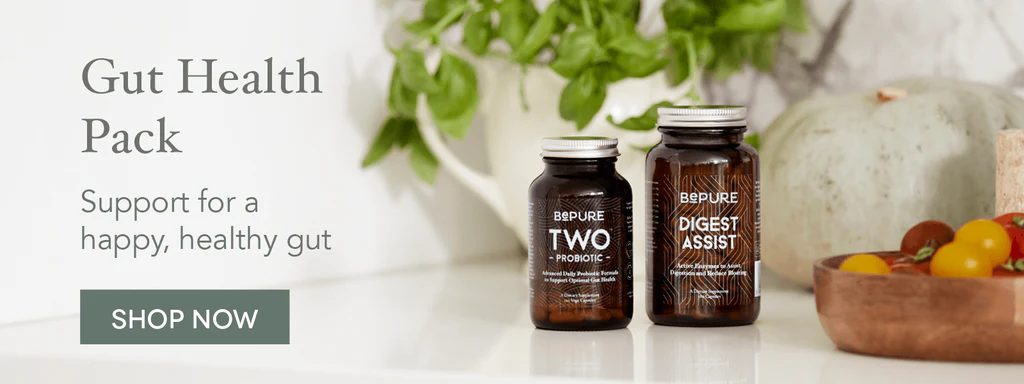The father of modern medicine, Hippocrates, said “all disease begins in the gut” and “let food be thy medicine and medicine be thy food”. These are two pillars that, here at BePure, we think form the foundation not just of health, but of wellness, too.
More modern research over the past two decades has affirmed this position showing that gut health is critical to overall health, and an unhealthy gut can contribute to a wide range of diseases including diabetes, obesity, arthritis, skin conditions and depression, to name a few.
5 ways our gut impacts all areas of health and wellness
Beyond bloating and indigestion, our gut affects every aspect of our health. Given that everything we eat is processed in our digestive system, and everything we eat affects the chemistry of our bodies, it makes sense that when it comes to wellness, it all starts in the gut.
In this blog, we’re going to explore some key aspects of health that are affected by the health of our gut health and share some simple ways that we can harness the power of our gut and the bugs that live within it to address common concerns that you may not have realised had anything to do with the gut!
Let’s look at:
When it comes to the health of our gut, it can be simplified by looking at two closely related variables that research says determine our gut health:
-
The intestinal microbiome: This is the collection of bacteria that reside within our gastrointestinal tract and is positively and negatively impacted by the internal and external environments that surround our body. This includes but is not exclusive to; what we eat, when we eat, our use of medications and antibiotics, exercise frequency and intensity, and our exposure to the outdoors.
- The gut barrier: This encompasses the physical lining of the gut organs and how it protects us from pathogens and infections. Its job is to keep everything we eat and drink moving along the digestive process in a timely manner and protect us from unwanted “lurgies” that make their way into our system. The gut barrier can be compromised by ongoing stress, alcohol, processed foods, and eating not enough fruit and vegetables.
The health and condition of both of these can be addressed and redressed through diet and nutritional support.
1. Gut Health and Skin
If you experience acne, dullness or dryness of your skin, eczema, psoriasis and other skin challenges, this one’s for you.
The health of our internal organs is often shown externally - through our skin - and in the quest for ‘perfect skin’ we spend a lot of money and time exploring topical solutions to a problem that is better addressed through dietary change - at little to no extra cost.
“Did you know that our skin is a detox organ. We expel one-third of our toxins through our skin!”
Because our skin is so closely linked to our gut, when our skin goes from glowing and clear to inflamed and red, we can bet that something is up with our gut health. When we have imbalances in our microbiome and a weakening of our gut barrier, we are more likely to experience skin inflammation. This happens for two reasons:
-
Our microbiome is an ecosystem: If we have a microbiome overrun with more bad bacteria, then good bacteria, our gut can’t function optimally. Since some of the jobs of the microbiome are to make nutrients, regulate hormones, and process toxins, you can see how having an imbalanced microbiome can lead to issues for our whole body, including our skin.
- Our gut lining needs to be strong to function well: When our gut barrier becomes weak, we develop what is called leaky gut. Leaky gut permits food particles and other substances from the inside of the gut (where they should be) to move into the tissues and blood supply that surrounds our gut organs (where they shouldn’t be). When this happens, the immune system identifies these “foreign invaders” and begins to build a defense response which leads to inflammation in both the gut and skin.

What can we do for skin health?
-
Balance your microbiome! Incorporate gut-loving and gut-strengthening foods into your diet. This means yoghurt, kombucha, kefir, sauerkraut (or anything fermented), and healthy wholefood carbs - our guts love carbs!
- Drink a lot of water. Water flushes toxins out. Unflushed toxins are stored in our cells so we want them gone! But, pro-tip: don’t drink too much water while eating as this can neutralise all those good digestive enzymes in our bodies that break down food - it pays to sip whilst eating and avoid gulping your beverages at meal times.
2. Gut Health and Mental Health
For anyone who experiences feelings of overwhelm or periods of low-mood:
For too long mental health has been viewed as separate to physical health. But, non-optimal physical health can lead to poor mental health and vice versa. While talking therapies and medication are absolutely the right choice for some people who struggle with their mental health, something we can all be doing more of, to buoy our emotions and buttress ourselves against low mood, comes from taking care of our gut.
“Did you know: The inner workings of your digestive system don’t just help you digest food, but also guide your emotions and help us by making happy neurochemicals.”
Serotonin - the happy hormone which is involved in regulating sleep, stress, emotions, and appetite - is made in the gut by our microbes. For this reason it isn’t surprising that there’s a strong link between our gut and mental wellbeing.
Studies have shown that alterations to the microbiome can “profoundly influence neurotransmission of serotonin in both the peripheral and central nervous systems”. As such, probiotics in the gastrointestinal tract can improve serotonin availability and has the potential to lift feelings of low mood.
Nutrition also plays a role in our mental well being. Micronutrient deficiencies driven by poor digestion and compromised gut function can lead to lower levels of our happy neurotransmitters as we need micronutrients such as the b-vitamins, zinc, and magnesium to produce neurochemicals like serotonin. In summary, the healthier and happier our gut and microbes are, the more nutrition we are able to make happy brain chemicals that keep us feeling good.
What can we do for mental health?
-
Take a multivitamin: To ensure that we’re getting all the nutrients we need to make all of our happy hormones. It’s very difficult to get all these nutrients from food so it helps to supplement them.
-
Take a broad spectrum probiotic: A balanced microbiome has a positive influence on our neurotransmitters.
- Include zinc and vitamin D in your routine, both are key crucial nutrients linked to both our gut health and mental health.

3. Gut Health and Food Sensitivities, Allergies, and Intolerances
The first thing to note here is the difference between these three types of food reactions. When we react to foods it is often the process of trial and error that helps us identify the link between our symptoms and the foods we eat that don’t serve us.
Sensitivities: These are not allergic reactions but are classed as food-based immune reactions. These often develop from increased gut permeability or ‘leaky gut’.
Allergies: Immune reactions where the body will produce IgE antibodies against the proteins found in that food. This leads to the release of histamines which can result in rashes, shortness of breath, and swelling of the throat and mouth (to name a few).
Intolerances: This will not trigger an immune response but are generally characterised by our body’s inability to break down a particular food i.e. lactose intolerance.
As we will learn in the next section, the vast majority of our immune system is in our gut. So, when we eat, our immune system can be triggered if our body thinks the food is a ‘threat’. When looking for specific proteins (like those found on the surface of bacteria, yeast and/or parasites) our immune system will ‘tag’ these proteins for destruction so that they can be flagged for destruction.
These protein structures are found in all living things and are all made of the same 20 amino acids or protein building blocks. With this understanding, it is easy to see how the immune system is able to readily tag and attack (almost) all protein structures they come in contact with, including the ones in our food.
When our gut lining becomes permeable, food proteins can ‘leak’ from the inside of the gut to our surrounding tissues (where it shouldn’t be) where it is met by our immune system. This can cause our immune system to ‘tag’ these seemingly “healthy” foods as foreign and attack them. This can lead to an increase in inflammation and the presentation of the likes of eczema or joint pain. This is also called leaky gut.
What can we do for gut health and food reactions?
-
Keep your gut health strong: Drinking a daily dose of bone broth or collagen helps to strengthen the gut lining and rebuild your gut barrier.
- Chew your food: Digestion starts in the mouth and there are no teeth beyond the oral cavity. Chewing our food until it’s almost liquid gives our gut a head start on digestion.
- Take a digestive aid: This will helps to prop the work of your organs in the upper part of the gastrointestinal tract by adding in extra right enzymes, bile salts and acids to help you breakdown your meal with ease
4. Gut Health and Immunity
One of the most common notions about our immune system is that when it has too much to do, it cannot work effectively. A bit like people! It needs to be ticking along nicely without too many tasks to have the resources available to hunt out, and disable, invaders like bacteria, virus, and pathogens.
Much to the surprise of many people, 80% of our humoral immune system (which creates antibodies) is located in our gut. When we eat and our food goes into our gut, our immune system assesses the food and decides if it’s harmful or helpful to our wellbeing.
When our immune system has to deal with and expel unwanted ‘invaders’ in our gut - it has to share redistribute resources to get the job done. This can mean that the food we ingest has the potential to create lots of work for our immune system. When the food we eat does not provoke our immune system, our immunity is ready and able to deal with invaders elsewhere in our body.
Based on this, you can really see how our gut health and immunity are so intertwined and looking after one, looks after the other!
What can we do to help our immunity?
- Limit your consumption of alcohol, caffeine, sugar, and processed foods. All of which have a negative impact on our microbiome and gut barrier
- Get a lot of sleep and drink a lot of fluids - sleep is how we rest, digest and repair. Adequate sleep aids our innate healing process and helps to foster good gut health.
-
Incorporate immune lifting nutrients and herbs like zinc, vitamins C & D, echinacea and holy basil in your life in food or supplement form.
5. Gut Health and Sleep
Sleep is the time our gut uses to “rest and digest”. It’s also the time when our microbiome is at its most active. Getting enough sleep is crucial for good gut function and a well functioning gut is vital for restful, nourishing and deep sleep. Bit of a catch-22.
Our circadian rhythm is our body clock. It tells us when to be asleep and awake and is directly impacted by our microbiome. This is due to the release and management of our daytime and nighttime hormones:
- Melatonin (for sleep)
- Cortisol (for activity).
If our gut isn’t healthy and our microbiome isn’t at optimal levels, then it disrupts the rhythm of these two hormones which can result in sleeping difficulties and poor gut function.
As we learned in the above section on the gut-mood connection, serotonin production is dependent on the health of our microbiome. Serotonin is the precursor to melatonin making it crucial to our sleep-wake cycle and the process of “resting and digesting”. This means that as we have the ability to alter our sleep-wake cycle just by modifying our nutritional intake and gut health - WOW!
Magnesium is also a great sleep aid. In addition to being involved in over 3000 enzymatic reactions in the body, magnesium works to help activate our rest and digest system which is responsible for sending signals throughout the body that tell all our cells to “calm down”. It also aids melatonin production and helps make our nightly sleep experience restful and restorative. It’s a real all-rounder!

What can we do to help our sleep?
-
Take care of you microbiome with a varied whole foods diet rich in fermented foods, prebiotics and probiotics
- Increase your magnesium intake through a high quality magnesium supplement and the ingestion of magnesium-rich foods like:
- Almonds
- Pumpkin seeds
- Spinach
- Edamame
- The absorption of nutrients is dependent on a healthy gut, so when our gut health is out of whack it is a great idea to take extra measures to ensure they’re getting the right amounts we need. This could include the addition of a high quality probiotic in supplement form.
In summary...
Skin, mental health, food tolerances, immunity, and sleep are just five of the areas we have focused on when it comes to our gut’s influence on our wellbeing. Really, it affects everything! Despite it being a vast and complex topic, the good news is that gut health can be redressed for all of these concerns (and plenty more) in effective ways that don’t need to cost us a lot of time or money.
- Nourishing our microbiome with a probiotic
- Eat a diet rich in fermented foods
- Support your immunity with the right nutrients
- Eating a whole food diet rich in variety are all things we can do without a significant change in lifestyle.
When we take care of our gut, we are taking care of our whole selves.


